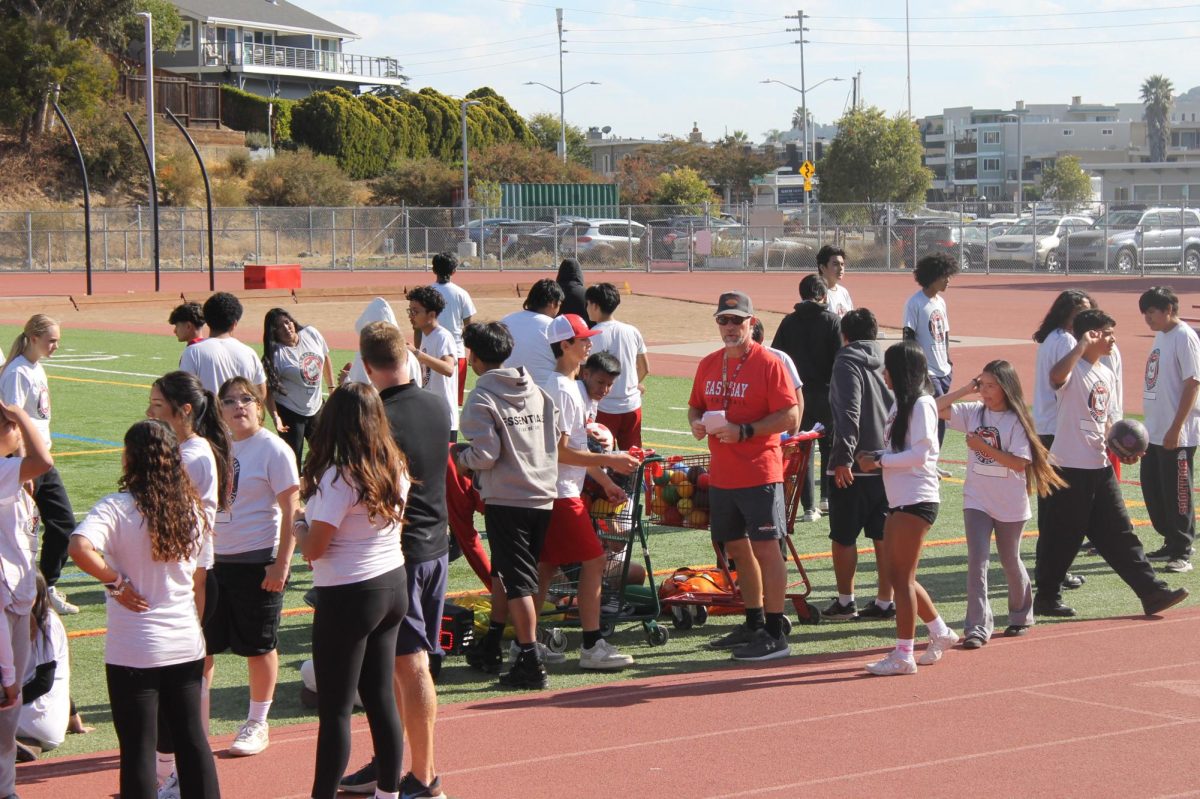It’s 11:40 pm, the assignment is due at 11:59 pm. After three days of putting off the assignment, you’re trapped face to face with reality. Freaking out trying to get it done and wondering if you’re the only one that slacked on doing the assignment.
Whether you were or weren’t the only one, procrastination is a universal experience. It’s a constant cycle that people allow themselves to be in, when they prioritize other things. They tend to fill their time with things they know will please them within that time frame. Even though they know their own responsibilities are waiting for them at home.
Procrastination is usually mistaken or misunderstood as a simple issue of poor time management. Which is actually, a psychological behavior that affects people on a daily basis. Whether it’s putting off writing a paper, delaying chores, or avoiding life decisions, procrastination is rooted in emotions, self- image, and mental ability.
“I know how important the assignment is to my grade,” claims Jackelyn Gonzalez, a junior at San Rafael High School. “Instead I get too overwhelmed and start gravitating towards my phone. Although it may cause me more stress, I enjoy scrolling through my phone.”
Procrastination isn’t just about not doing your homework or leaving stuff until the last minute. It’s more about that uneasy feeling of not wanting to do it. That feeling of dreading something you know won’t bring you joy. Teenagers especially tend to be the victims of procrastination. Some teenagers put aside doing homework or chores because they know it won’t satisfy them. These uneasy feelings don’t just affect teenagers while contemplating whether they should do their homework or not. It also affects them mentally by building guilt and regret.
“My mind just switches off from school, when I get home,” says Andrew Regan, a senior at San Rafael High. “I disassociate myself from school and take a nap or just forget about school. I know the assignment is due next week so there’s no rush to complete it.” Andrew claims that once school is over it’s the least of his worries. Although Andrew may not be doing his work after school, he wakes up at the crack of dawn to finish it from the day prior. It creates a system that works for him. It helps him avoid any burn outs. This may result in rushed assignments and lack of sleep.
Students have different strategies that help manage the workload they have. Planning ahead of time can be more helpful and effective. “Having a set schedule on what assignments take longer to complete has helped me stay on track and have a good set timeline,” says senior Aneglli Cifuentes.
Mental health is an important thing to prioritize especially as a student that has multiple responsibilities, whether that be school or personal. Balancing many tasks at once can be very overwhelming and ultimately lead to burnouts and a decrease in productivity. It can be harder for those to focus on one thing and make them rush through their other tasks. Many students can agree that they are too fixade in trying to succeed in their futures that sometimes we procrastinate and affect us in the long run. We start to build habits that can affect us negatively on our journey to college.
Irma Rivera, a family and marriage therapist, claims that “when teenagers start procrastinating it starts to psychologically make them feel bad about themselves. They start to focus on negatives or how to avoid these certain feelings. Procrastination is just a symptom of a lot of things going on with their lives.” Dr. Rivera has worked with a few cases of procrastination within teenagers and expresses what she has noticed during her years as a psychologist.
Overtime teenagers have slacked their motivation in completing school work that has led to bad habits, which goes to affect our brains in the process. “These habits start to create brain pathways of negative thoughts and strengthen the negative thoughts, which tends to lead into bad habits like procrastination, depressions and drug uses,” states Dr. Rivera. With many cases of procrastination she has taken on, she has noticed that these cycles weren’t ending but rather continuing overtime. “I’ll open the assignment and then close it five seconds later,” says Ariana Lopez, a junior at Terra Linda High. “It’s like my brain just shuts down the second I see a blank Google Doc.”
When students develop bad pathways it affects their brain. As students tend to avoid doing tasks that don’t please them, they tend to seek pleasure. Our brains are wired to seek pleasure through rewards regardless if it’s short term or long term. Our brain seeks and feels a type of pleasure through a chemical called dopamine. An article by Hope Cristol, Kristin Mitchell and Angela McPhillips titled, “Dopamine: What It Is & What It Does,” published in 2024, stated: “Dopamine is a hormone and a type of neurotransmitter, or chemical messenger, made in your brain.” Anytime people do something that may bring them excitement or joy – like watching TikTok or a funny video- the brain releases dopamine into our system which strengthens our behaviors. These pathways start to get engraved into your brain.
Procrastination can have a negative impact on students and their academics. Students try very hard and put in time and dedication to their studies, but end up mentally drained. Many students genuinely care about their education and try hard to succeed. But different events in students’ lives can feel overwhelming at times, like schoolwork, combined with emotional and social stress, can lead to burnouts at times. An article by American Psychological Association (APA) titled, “Teen stress rivals that of adults,” published in 2014, stated: “high school students report stress levels similar to those of adults, with school being a major source.”The issue is not just procrastination but having so much school work has an impact. The dred to finish assignments after going to school for 7-8 hours, can be an issue towards procrastination.
“I feel as students nowadays can never get rid of homework which leads to them feeling burned out,” adds Dr. Rivera, “which is the cause of procrastinating and feeling burned out by their junior year because of how dedicated they are and motivated. Sometimes students just need a break from all the homework.” Dr. Rivera talks about how school is burning out students as they are pushing themselves to be a better version of themselves or maybe better than those around them. Sometimes teachers don’t understand the different struggles students may go through. Which is why students tend to start seeking whatever brings them pleasure and put their responsibilities on the back burner.
“I personally am paying for most of my college things myself, like my apps, tuition, and my housing. So yes I have to work two jobs to support myself and it can be draining at times so of course sometimes homework is the last of my worries,” states senior Sophia Foronda.
Different family cultural backgrounds can lead to procrastination or be a factor in their procrastination. Sometimes we’re too quick to judge students and assume they fall behind because they either want to socialize or simply because they don’t want to do the work. But in reality family plays a big role in some scenarios. In many households, seen in immigrant or working-class communities, students are expected to take on adult responsibilities. Like taking care of younger siblings, cooking, cleaning, or running errands. According to Pew Research Center, 38% of Latino and Black teenagers in the U.S. help care for siblings or extended family after school—compared to 25% of white teen.( The Modern American Family, 2023). These extra responsibilities tend to take over into the time needed for schoolwork or put in less effort to get it over with, leading to academic backtrack.
“For me, when I get home I get straight to doing chores. My mom comes home from a long day at work and I don’t want to put that extra pressure on her to keep the house clean and make dinner. Homework for me is the last thing I do before going to bed, but sometimes I don’t have time for that,” states Litzy Aguilara, senior at Terra Linda High.
Different people prioritize different responsibilities, school isn’t always someone’s top choice.
“It’s not just school,” says Ms. Hager, an English teacher. “Students nowadays are dealing with a lot of stressors involving family responsibilities, political stresses and school stress- all of which lead into procrastination. We have to become better at teaching students how to understand and manage their lifestyles, not just creating deadlines and harder tasks amongst them.” Ms. Hager sees the struggles and difficulties students go through, that she has taken time from her class time to allow students to finish their assignments. Sometimes students just need the extra support from teachers that they may not get at home.
At times students can get easily distracted with the responsibilities at home that they forget about their school work and school priorities. “I appreciate when teachers give us students extra time to finish our classwork,” says Brianna Dominguez, a senior at SRHS. Brianna tends to take these opportunities and uses them to her advantage to finish up all her school work.
Even though procrastination can be harmless at first, it can lead to bigger things. We tend to see procrastination as an issue of any sort but it does lead to higher stress levels and mental effects. An article published in 2023 by Fuschia M Sirois titled, “Procrastination and Stress: A Conceptual Review of Why Context Matters” says, “that chronic procrastinators experience higher levels of stress, depression, and poor health outcomes.” This can result in poor academic skills, lack of motivation and lower grades.
“A lot of students at times, may find short- term systems that can feel efficient,” says David Noble, a psychotherapist and counselor to adolescents and families. “Long term, it builds cycles of anxiety, which doesn’t help you prepare for the demand and hardships college and adult life brings you.” In the moment procrastination doesn’t seem like a big deal but overtime it can affect your self-esteem and future habits. We start to feel comfort within these habits that we forget the consequences that comes with it. We continue these cycles that never seem to end and just continue recurring overtime. These short- term effects cause students to stick with these bad habits, when transitioning into college. It doesn’t prepare them for good study goals or good habits in general.
During your first years of high school procrastination comes and goes. You want to be ahead of your work and maintain a good transcript for schools.You want to immerse yourself in clubs, sports, and student activities. By your senior year, you start to feel the excitement and exhaustion. Some make the last months count, they are determined to end the year strong and maintain their GPA while others take it less seriously and have a more relaxed approach to their senior year. Classes start to feel optional, lunches take longer, and the countdown to graduation is all they can think about. I remember senioritis starting to hit when my friends would text me asking if I wanted to skip an advisory to get brunch. Of course I would trade good food for an hour long period of studying. You can fight procrastination all you want but in the end, whether you embrace it or not, it shapes the high school experience in ways you wouldn’t even think of until your time in high school comes to an end.
“Procrastination can be considered a mind game,” says Daniel Nemiroff, a school counselor at SRHS. “Students try to convince themselves that they will get things done later on-and oftenly they do-but it’s at a sacrifice of dedication and long- term success.” There’s a mental tug-a-war game being played in your head when staring at that blank document, convincing yourself that tomorrow will be the start of the paper. While students start their assignments at the last minute, it not only comes with stress but also missed opportunities to improve their work by refining it, and building stronger habits. This highlights the importance of Mr. Nemiroff’s point of how procrastination affects students’ long-term growth.
Students can avoid procrastination although it’s difficult at times, it’s not impossible. Senior David Balderama and Frank Faulkner both have tips on how to avoid or help with procrastination. “Give yourself a goal time to finish an assignment, you’ll feel more accomplished even if it’s only 30 minutes that you set aside,” says David. Time management isn’t just about finishing up a task but rather training your brain to focus more efficiently. When students set up a deadline that is manageable for them, it creates a pattern that makes bigger assignments feel less overwhelming or time consuming.
Frank adds that “having a planner and writing down all your assignments gives you a good visual on when assignments are due, so you have time to finish it before the deadline.”
Physically writing down your assignments can declutter your mind and help you organize and take control of your workload.













































